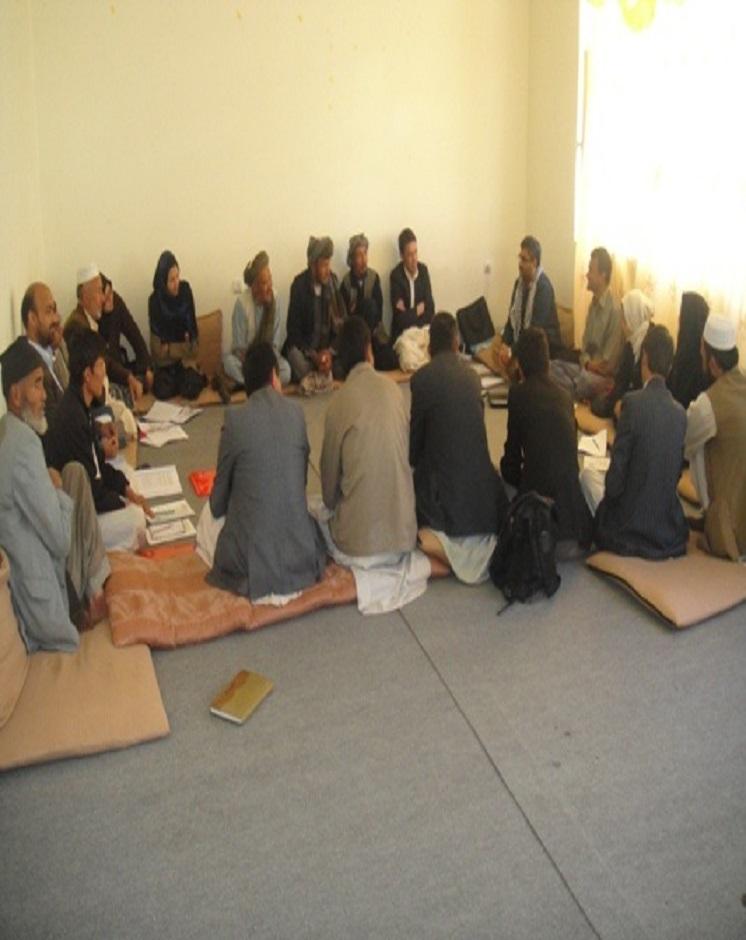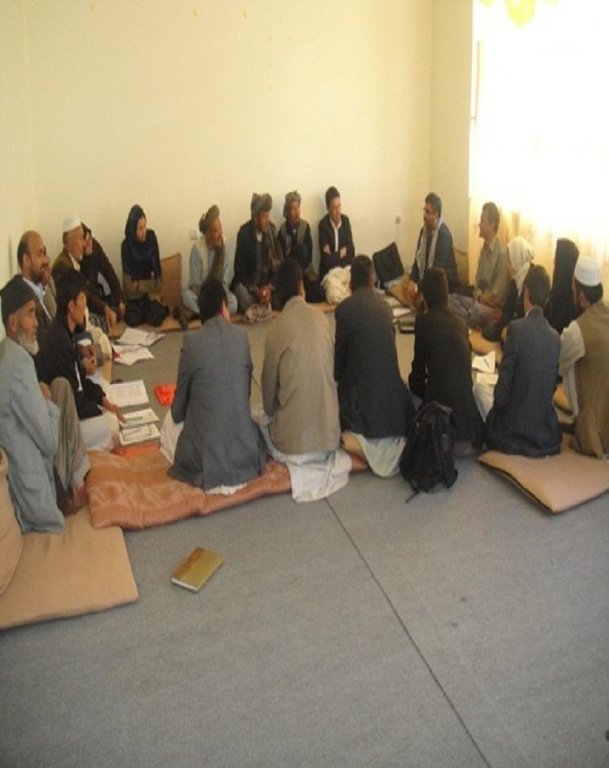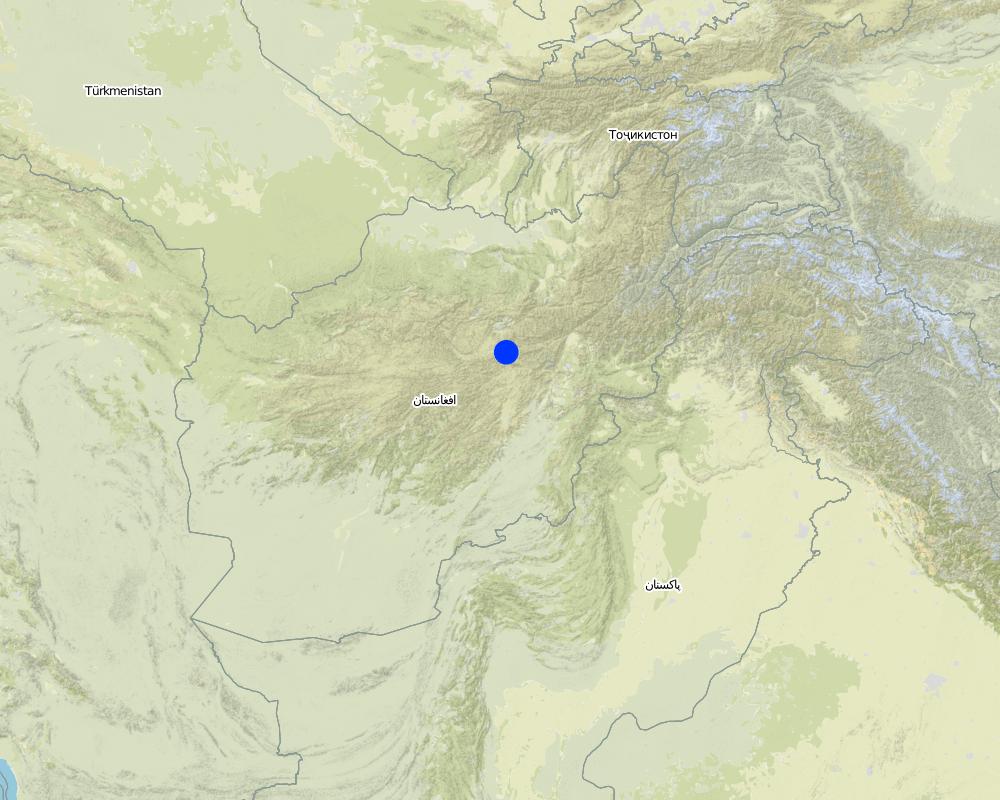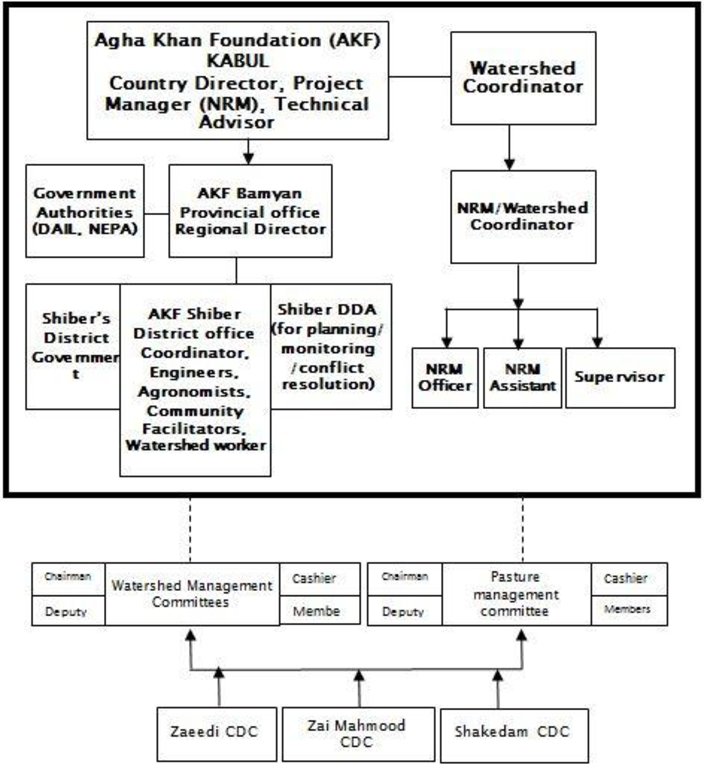Community-based Natural Resource Management [Афганистан]
- Шинийг нээх:
- Шинэчлэх:
- Эмхэтгэгч: Aqila Haidery
- Хянан тохиолдуулагч: –
- Хянагч: Deborah Niggli
Tanzeem Manabae Tabiee Tawasut Mardum (Dari)
approaches_2542 - Афганистан
Бүлгүүдийг үзэх
Бүгдийг дэлгэх Бүгдийг хаах1. Ерөнхий мэдээлэл
1.2 Арга барилыг баримтжуулах болон үнэлгээ хийхэд оролцсон хүн эсвэл байгууллагын холбоо барих хаяг
ГТМ мэргэжилтэн:
ГТМ мэргэжилтэн:
ГТМ мэргэжилтэн:
Ahmadi Ghulam Sakhi
AKF
Афганистан
ГТМ мэргэжилтэн:
Jalil M. Altaf
AKF
Афганистан
ГТМ мэргэжилтэн:
Hussaini Marzia
Афганистан
ГТМ мэргэжилтэн:
Hussaini Baqir
Афганистан
ГТМ мэргэжилтэн:
Wafa Jawad
Афганистан
ГТМ мэргэжилтэн:
Jawadi Asadullah
Афганистан
ГТМ мэргэжилтэн:
Yagoo Alex
Афганистан
ГТМ мэргэжилтэн:
Eqbal Muhammad
Афганистан
Арга барилыг баримтжуулах/үнэлэх ажилд дэмжлэг үзүүлсэн байгууллага(ууд)-ын нэр (шаардлагатай бол)
HELVETAS (Swiss Intercooperation)1.3 WOCAT-аар баримтжуулсан өгөгдлийг ашиглахтай холбоотой нөхцөл
Мэдээллийг хэзээ (газар дээр нь) цуглуулсан бэ?
25/08/2015
Эмхэтгэгч болон гол мэдээлэгч хүн(хүмүүс) WOCAT аргачлалаар баримтжуулсан мэдээллийг ашиглахтай холбоотой нөхцлийг хүлээн зөвшөөрсөн:
Тийм
1.4 ГТМ-ийн технологийн асуулгын(д) суурь мэдээлэл(д)
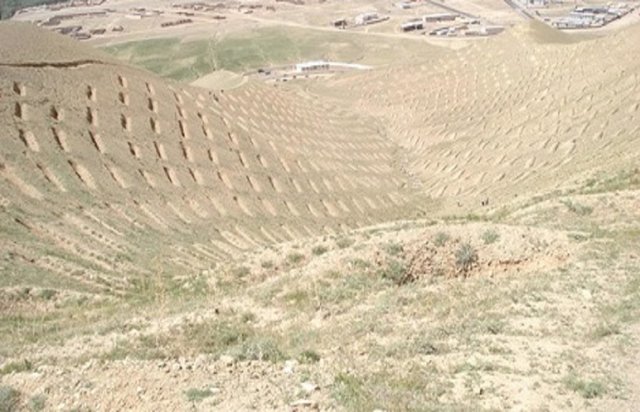
Staggered Contour Trench [Афганистан]
Earthen trenches with soil bunds built along contours in staggered design
- Эмхэтгэгч: Aqila Haidery
2. ГТМ Арга барилын тодорхойлолт
2.1 Арга барилын товч тодорхойлолт
An approach to community participation in the sustainable management of natural resources
2.2 Арга барилын дэлгэрэнгүй тодорхойлолт
Арга барилын дэлгэрэнгүй тодорхойлолт:
The main objective of the intervention was to reduce the surface run-off and sediment flow from the selected degraded watershed, with soil and water conservation measures through community participation.
Agha Khan Foundation and representatives from the selected Community Development Councils (CDC) surveyed the area and discussed the main land use problems. On the basis of feasibility surveys, potential SLM technologies were identified and implemented. Contour lines were prepared with the help of an A-frame and lime. Several men from Zai Mahmood village were employed as daily wage workers for the technology implementation works. The land users used their own tools for trench excavation. Each worker excavated on an average one trench per day. The daily wage was 250 AFS/USD.
The project was executed over two years. In addition to the structural measures, training and exposure visits for watershed management committee and pasture committee members, reseeding of more areas, tree plantation campaigns and group-based women vegetable farming were realized. Women were employed for seed collection work with cash for work approach. The area was protected from grazing and shrub cutting pressure. Seeds of different fodder varieties and shrubs were also cultivated.
Since the realization of the project in 2008, soil and vegetation cover has improved, people’s knowledge about soil and water conservation has increased, flash floods have been controlled and discharge in the spring located below the watershed has increased by about 40%. AKF continues to support the target communities with community development and institution building. The water-shed work is sustained by a watershed and pasture management committee appointed by the people from three respective CDCs.
The Community-Based Natural Resource Management approach is documented by Sustainable Land Management Project implemented/HELVETAS Swiss Intercooperation which is funded by Swiss Agency for Development and Cooperation with close support and cooperation of the Agha Khan Foundation (AKF).
The watershed project was funded by AusAID. The Aga Khan Foundation (AKF) facilitated the implementation by the community. The project was implemented in Zai Mahmood mountain slope area in Zai Mahmood village, Shiber district, Bamyan Province. The village, located downstream from the site, experienced problems such as excessive surface runoff/flash floods, snow avalanches, soil erosion, lack of drinking water, lack of soil moisture at the site.
2.3 Арга барилын зурагууд
2.5 Арга барил нэвтрүүлсэн улс орон / бүс нутаг / байршил
Улс:
Афганистан
Улс/аймаг/сум:
Zai Mahmood village
Байршлын дэлгэрэнгүй тодорхойлолт:
Bamyan center, Afghanistan
Map
×2.6 Арга барилыг эхлэх, дуусах огноо
Эхлэх жилийг тэмдэглэ:
2008
2.7 Арга барилын төрөл
- төсөл / хөтөлбөр дээр үндэслэсэн
2.8 Арга барилын үндсэн зорилго, зорилтууд
The Approach focused mainly on SLM with other activities (Disaster Risk Reduction, Pasture Improvement, Gender Equity, Income Generation)
Strengthen the capacity (organizational and technical), of the community to: restore their degraded lands, demonstrate multi-purpose soil and water conservation measures, reduce floods and snow avalanches, improve pastures, improve gender equity and the involvement of social disadvantaged groups, employment and income generation
The SLM Approach addressed the following problems: Lack of knowledge in terms of sustainable watershed management; poverty; drought; floods and avalanches
2.9 Арга барилын хүрээнд хэрэгжсэн Технологи/Технологиудад дэмжсэн эсвэл саад учруулсан нөхцлүүд
нийгэм / соёл / шашны хэм хэмжээ, үнэт зүйлс
- Хазаарлалт
Community-based management capacity was weak
Treatment through the SLM Approach: CDCs capacities were enhanced
санхүүгийн нөөц, үйлчилгээний хүртээмж / боломж
- Хазаарлалт
Community’s low economy
Treatment through the SLM Approach: AKF provided financial support; also there were contributions from the participating community
Бүтэц зохион байгуулалт
- Хазаарлалт
Lack of organizational structures
Treatment through the SLM Approach: Watershed and pasture management committees formed
ГТМ-ийн талаарх мэдлэг, техникийн дэмжлэг авах боломж
- Хазаарлалт
Lack of technical awareness
Treatment through the SLM Approach: AKF provided technical support
3. Оролцогч талуудын оролцоо ба үүргүүд
3.1 Арга барилд оролцогч талууд болон тэдгээрийн үүргүүд
- Орон нутгийн газар ашиглагч / орон нутгийн иргэд
- олон нийтэд түшиглэсэн байгууллагууд
3.2 Арга барилын янз бүрийн үе шатанд орон нутгийн газар ашиглагчид / бүлэглэлүүдийг татан оролцуулах
| Орон нутгийн газар ашиглагч / орон нутгийн иргэдийн оролцоо | Хэн оролцсоныг тодорхойлж, үйл ажиллагааг тайлбарлана уу | |
|---|---|---|
| санаачлага/идэвхжүүлэлт | интерактив | Meetings and Workshops for men and women |
| Төлөвлөгөө | интерактив | With CDC members, mainly men for watershed works |
| Хэрэгжилт | Гадаад дэмжлэг | Interactive, Cash for work, Contributions from communities as well |
| Мониторинг/ үнэлгээ | интерактив | Ad hoc observations |
| Research | интерактив | Analyzing technology performance and making adjustments if required |
3.3 Диаграм (хэрэв боломжтой бол)
Тодорхойлолт:
The organization structure of the NRM project implemented in Zai Mahmood village, Shiber district, Bamyan, Afganistan
Зохиогч:
Agha Khan Foundation (AKF)
3.4 ГТМ-ийн технологи/технологиуд сонгох шийдвэр
Хэрэгжүүлэх Технологи/Технологиудын сонголтыг хийж шийдвэр гаргасан хүнийг тодорхойлно уу:
- голдуу ГТМ-ийн мэргэжилтнүүд, газар ашиглагчидтай зөвлөлдсөний үндсэн дээр
Тайлбар:
AKF conducted awareness workshops before project implementation.
Decisions on the method of implementing the SLM Technology were made by mainly by land users supported by SLM specialists. land users implemented the technology after receiving guidelines from SLM specialists.
4. Техникийн дэмжлэг, чадавхи бүрдүүлэх, мэдлэгийн менежмент
4.1 Чадавхи бэхжүүлэх/сургалт
Газар эзэмшигчид / бусад оролцогч талуудад сургалт явуулсан уу?
Тийм
Хэн сургалтанд хамрагдсан бэ:
- Газар ашиглагчид
- хээрийн ажилтан / зөвлөх
Сургалтын хэлбэр:
- Ажил дээр
- фермерээс -фермер
- үзүүлэнгийн талбай
- Олон нийтийн уулзалт
Хамрагдсан сэвдүүд:
Vegetable farming for women; soil and water conservation; watershed management; pasture management. Training was mainly on-the-job, and awareness was raised through public meetings, site visits and demonstrations.
4.2 Зөвлөх үйлчилгээ
Газар ашиглагчдад зөвлөх үйлчилгээ авах боломжтой байдаг уу?
Тийм
Тодорхойлолт / тайлбар:
On-site visits by DAIL (Department of Agriculture, Irrigation and Livestock; Key elements: Pasture management, Site selection
Advisory service is quite adequate to ensure the continuation of land conservation activities; The government or other advisory service is quite adequate to ensure the continuation of land conservation activities although the staff turnover rate in government sector is high. DAIL Bamyan office has the technical capacity but not adequate financial resources.
4.3 Институцийг бэхжүүлэх (байгууллагын хөгжил)
Арга барилаар дамжуулан институц байгуулагдаж эсвэл бэхжсэн үү?
- Тийм, маш их
Байгууллагууд бэхжиж, үүсэн бий болсон түвшин(үүд)-г тодорхойлно уу:
- Орон нутгийн
Дэмжлэгийн төрлийг ялга:
- Санхүүгийн
- чадавхи бэхжүүлэх / сургалт
Дэлгэрэнгүй мэдээллийг өгнө үү:
CDCs and District Development Assembly (DDA) in terms of financial and capacity building of participating
4.4 Мониторинг ба үнэлгээ
Мониторинг болон үнэлгээ нь арга барилын хэсэг үү?
Тийм
Тайлбар:
bio-physical aspects were regular monitored by project staff, land users through measurements; indicators: Biomass before and after
technical aspects were ad hoc monitored by project staff, land users through observations; indicators: growth of saplings, shrubs and fodder grasses (alfalfa)
socio-cultural aspects were ad hoc monitored by project staff, land users through measurements; indicators: Water availablity, food security, income
economic / production aspects were regular monitored by project staff through measurements; indicators: fodder production, income
area treated aspects were ad hoc monitored by project staff through measurements; indicators: areas where technology was applied
no. of land users involved aspects were regular monitored by project staff, land users through measurements; indicators: CDCs and men and women involved
management of Approach aspects were regular monitored by project staff, government, land users through observations; indicators: area protected or not
There were few changes in the Approach as a result of monitoring and evaluation: Women has given some more chances for the participation but still there is long way to go. There were some technology refinements and adjustments in project management.
4.5 Судалгаа
Судалгаа арга барилын хэсэг нь байсан уу?
Тийм
Сэдвийг тодруулна уу:
- Социологи
- Эдийн засаг/ зах зээл
- Экологи
- Технологи
Дэлгэрэнгүй мэдээллийг өгч, хэн судалгаа явуулсныг бичнэ үү:
However there are no publications to verify that. Research was carried out on-farm
5. Санхүүгийн болон гадаад материаллаг дэмжлэг
5.1 ГТМ-ийн Арга барилын бүрэлдэхүүн хэсгийн жилийн төсөв
Хэрэв жилийн төсөв тодорхойгүй бол хягаарыг тодруулна уу:
- 10,000-100,000
Тайлбар (жнь: санхүүжилтийн гол эх үүсвэр / гол хандивлагчид):
Approach costs were met by the following donors: international: 50.0%; national non-government: 30.0%; local community / land user(s): 20.0%
5.4 Кредит
Арга барилын хүрээнд ГТМ-ийн үйл ажиллагаанд зориулж зээлд хамрагдсан уу?
Үгүй
5.5 Бусад урамшуулал, хэрэгсэл
ГТМ-ийн технологийг хэрэгжилтийг дэмжихэд ашигласан бусад урамшуулал, хэрэгсэл байсан уу?
Үгүй
6. Нөлөөллийн дүн шинжилгээ ба дүгнэлт
6.1 Арга барилын нөлөөллүүд
Арга барил нь ГТМ-ийн технологийг хэрэгжүүлж, хадгалахад газар ашиглагчдад тусласан уу?
- Үгүй
- Тийм, бага зэрэг
- Тийм, зарим
- Тийм, их
Increased water and soil quality with more vegetation and reduction in floods
Арга барил нь эмзэг бүлгийнхнийг нийгэм, эдийн засгийн хувьд чадавхижуулсан уу?
- Үгүй
- Тийм, бага зэрэг
- Тийм, зарим
- Тийм, их
Through increased decision-making powers about natural resources by poor and marginalized members of the community.
Did other land users / projects adopt the Approach?
- Үгүй
- Тийм, бага зэрэг
- Тийм, зарим
- Тийм, их
There is no spontaneous adoption.
Did the Approach lead to improved livelihoods / human well-being?
- Үгүй
- Тийм, бага зэрэг
- Тийм, зарим
- Тийм, их
Cash for work improved income of some families, flash floods reduced, spring discharge increased, natural assets preserved.
Did the Approach help to alleviate poverty?
- Үгүй
- Тийм, бага зэрэг
- Тийм, зарим
- Тийм, их
By increasing water for agriculture and feed for livestock
6.2 ГТМ-ийг хэрэгжүүлэх газар ашиглагчидын гол санаачилга
6.3 Арга барилын үйл ажиллагааны тогтвортой байдал
Газар ашиглагчид арга барилаар дамжуулан хэрэгжүүлсэн арга хэмжээг тогтвортой хадгалж чадах уу (гадны дэмжлэггүйгээр)?
- Тодорхойгүй
Хэрэв үгүй эсвэл тодорхойгүй бол дэлгэрэнгүй тайлбар өгнө үү:
Although the participating CDCs indicate that they will continue to manage the watershed properly
6.4 Арга барилын тогтвортой/давуу тал/боломжууд
| Эмхэтгэгч, бусад мэдээлэл өгсөн хүмүүсийн өнцгөөс тодорхойлсон давуу тал/боломжууд |
|---|
| Increase in vegetation cover |
| People knowledge regarding SWC improved |
| Increase in spring water |
| Flash flood controlled |
| Watershed and pasture management committees formed |
6.5 Арга барилын дутагдалтай/сул тал/аюул болон тэдгээрийн хэрхэн даван туулах арга замууд
| Эмхэтгэгч, бусад мэдээлэл өгсөн хүмүүсийн өнцгөөс тодорхойлсон сул тал/ дутагдал/ эрсдэл | Тэдгээрийг хэрхэн даван туулах вэ? |
|---|---|
|
Disturbance in NRM / soil disturbance |
Minimize the soil disturbance, and compact the excavated soil |
| Increase in mice | Compact the excavated soil, other control measures |
| Plant growth is slow due to high elevation | Choose adaptable species |
| No watershed benefit sharing mechanism in place | Benefit mechanism be developed in a participatory way and agreed by the land users and other stakeholders |
7. Суурь мэдээлэл болон холбоосууд
7.1 Мэдээллийн эх үүсвэр/аргууд
- Хээрийн уулзалт, судалгаа
- Газар ашиглагчтай хийсэн ярилцлага
Холбоос ба модулууд
Бүгдийг дэлгэх Бүгдийг хаахХолбоосууд

Staggered Contour Trench [Афганистан]
Earthen trenches with soil bunds built along contours in staggered design
- Эмхэтгэгч: Aqila Haidery
Модулууд
Модуль байхгүй байна


